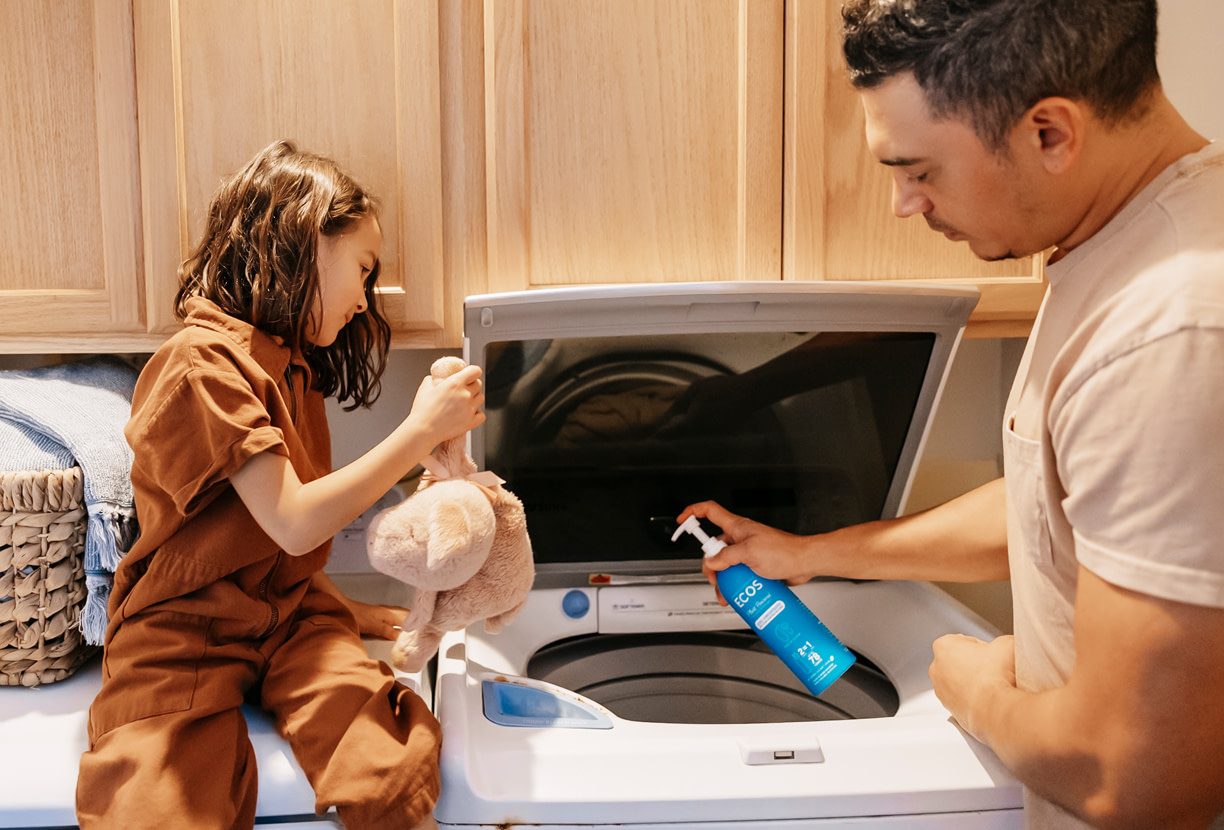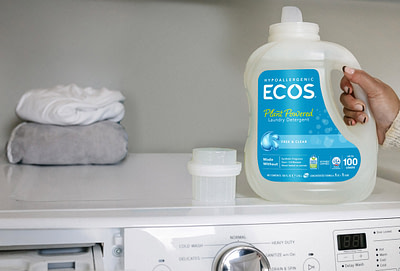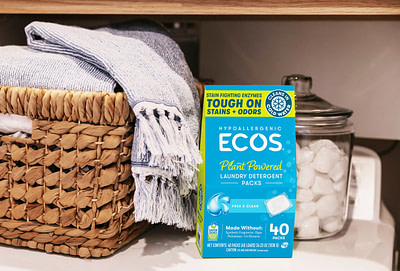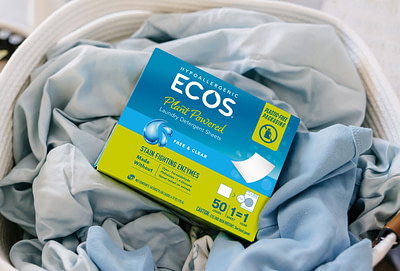Eco-Conscious Laundry and Water Conservation: How to Preserve Resources
6 minute read

Did you know that a single load of laundry can consume up to 40 gallons of water? Imagine the environmental impact of running your washing machine when we multiply this figure by the numerous loads we do throughout the year. Additionally, many conventional detergents contain ingredients that can harm aquatic ecosystems. But not all is lost; adopting more sustainable washing practices and choosing appropriate products can make a significant difference.
In this article, we offer some practical and straightforward tips to optimize your laundry habits, reduce water and energy consumption, and select detergents that are safer for the environment. You’ll discover how small actions can significantly contribute to the conservation of our natural resources and the care of our planet.
1. Check Clothing Care Labels
Have you ever ruined your favorite garment by not following the washing instructions? Care labels on clothing are not just for aesthetics; they provide essential information to keep your garments in optimal condition. By following these indications, you not only prolong the lifespan of your clothes but also avoid unnecessary washes that consume water and energy. Before tossing everything into your washing machine drum, take a moment to read the labels and ensure you’re providing the proper care for each garment.
2. Wash Only When Necessary
Do you really need to wash that t-shirt you wore for just a couple of hours? Often, we tend to wash clothes after each use out of habit, but many garments can be worn several times before needing a deep clean like jeans. Denim is a fabric that doesn’t need to be washed after every wear. Airing out clothes or performing a superficial cleaning can be sufficient in many cases. By reducing the frequency of washing, you not only conserve water and energy but also decrease fabric wear, making your clothes last longer.
3. Use the Washing Machine Efficiently
Did you know that a full washing machine uses less water and energy per garment than several small loads? Waiting until you have a full load before running the washing machine maximizes the efficiency of each cycle. Additionally, opting for cold or low-temperature wash programs can be just as effective for cleaning clothes, especially with modern detergents, and consumes less energy. Being more strategic with your laundry loads significantly contributes to resource conservation.
4. Choose Plant-powered Detergents
Selecting the right detergent can have a significant impact not only on preserving your favorite garments but also on the environment. Opting for detergents that contain several plant-derived ingredients is an excellent way to reduce the introduction of harmful substances into our aquatic ecosystems. For example, ECOS offers a variety of options, including:
- Hypoallergenic Laundry Detergent – Fragrance-Free: This detergent uses coconut-derived cleaning agents to break down odors and remove stubborn stains. It’s formula is 100% vegan, gentle on sensitive skin, and safer for septic systems and gray water.

- Laundry Detergent Pods – Fragrance-Free: These pods provide a practical and sustainable solution for washing, eliminating the need to measure and pour liquid detergent. Simply place a pod in your washing machine drum for effective cleaning.

- Ultra-Concentrated Liquid Laundry Detergent – Fragrance-Free: This ultra-concentrated detergent dissolves perfectly in hot or cold water and is ideal for high-efficiency and standard machines. With just two pumps, you get the perfect amount for each wash, offering powerful cleaning with less product.

-
Laundry Detergent Sheets: They represent an eco-conscious and effective alternative to traditional detergents. Made with several plant-derived ingredients, these hypoallergenic sheets dissolve completely in water, releasing cleaning agents and enzymes that combat stains and odors, leaving clothes fresh and clean.
Their lightweight design and plastic-free packaging contribute to waste reduction and facilitate transport and storage. This allows for more product to be transported in less space, reducing the carbon emissions associated with shipping and distribution. Being lightweight and compact, they are much easier to carry, especially for those who don’t have a washing machine at home and need to take their laundry to a laundromat. They offer a practical alternative to liquid and powder detergents, which can be bulky and difficult to handle. Thanks to their compact design, they are perfect for people living in small spaces or those who travel frequently. They are easy to store and transport without the risk of spills, making them an excellent choice for any lifestyle.
Available in varieties like Lavender Vanilla, Magnolia and Lily, and Fragrance-Free, they offer options for different preferences. Additionally, their vegan formula makes them a sustainable choice for clothing care.

5. Avoid Using Fabric Softeners
Although fabric softeners can leave your clothes feeling softer and smelling pleasant, many contain substances that can be harmful to the environment and certain sensitive skins. With ECOS detergents, you don’t need to add fabric softener, because we use an ingredient called Cocamidopropyl Betaine. This is an amphoteric surfactant, which means it has both positive and negative charges. The positive charges can attract the negative charges of fabrics and fibers, helping garments feel softer.
6. Air Dry Clothes Outdoors
Do you remember the freshness of clothes dried on an outdoor clothesline? Whenever possible, opt to dry your garments outside your home instead of using the dryer. This method not only saves energy but is also less harsh on fabrics, preserving their quality and durability. Take the precaution of placing the clothesline in the shade so that the sun doesn’t dull the brightness of your clothes’ colors.
7. Perform Regular Washing Machine Maintenance
A well-maintained washing machine not only has a longer lifespan but also operates more efficiently, resulting in lower water and energy consumption. Biofilm buildup, which leads to bacteria growth and the development of bad odors, is one of the biggest issues with front-loading washing machines in particular. Often, biofilm accumulation in a washer can compromise the effectiveness of detergents, causing clothes to come out without a fresh scent or feeling truly clean.
Additionally, leaving laundry inside the washer for extended periods (instead of removing it immediately after the cycle finishes) contributes to bacterial growth, leading to unpleasant odors that can transfer onto clothes.
Clean the filters regularly, check the seals to prevent mold buildup, and perform periodic cleaning cycles according to the manufacturer’s recommendations. These practices ensure that your washing machine operates at its peak performance, benefiting both your garments and the environment.
Stain Treatment with ECOS Products
Stains can be challenging, but addressing them effectively and sustainably is possible with the right products. ECOS offers specialized solutions to treat tough stains without compromising the environment:
- OxoBrite® Multi-Purpose Stain Remover – Fragrance-Free: This mineral-based stain remover eliminates tough stains, brightens colors, and enhances whites in clothing. It’s a safer alternative to traditional bleach and can be used both in laundry and household cleaning.
- Stain and Odor Remover – Lemon: Formulated with sustainable enzymes and potato peel sugars, this stain remover effectively eliminates stains and odors from clothing, carpets, upholstery, and other fabrics, leaving a pleasant lemon scent.
Additional Tips for Stain Treatment:
- Act Quickly: The sooner you treat a stain, the greater the chances of completely removing it.
- Pre-Treatment: Apply the stain remover directly to the stain, gently rub, and let it sit for a few minutes before washing the garment as usual.
- Avoid Heat: Do not dry the garment in the dryer until you’re sure the stain has disappeared, as heat can set the stain permanently.
Adopting more sustainable washing practices not only contributes to the conservation of our natural resources but also promotes a more eco-conscious lifestyle. Small changes in our laundry routine can have a significant impact on protecting our planet. By choosing products like those from ECOS and following these tips, we are taking important steps toward a more sustainable future.
Sources:
- American Cleaning Institute.
Tips for washing clothes.
https://www.cleaninginstitute.org/cleaning-tips/clothes/stain-removal-guide - U.S. Department of Energy (DOE).
Provides tips for saving energy when doing laundry, such as using cold water and optimizing washer loads.
DEPARTMENT OF ENERGY - ENERGY STAR.
Offers information on energy-efficient washers and dryers, highlighting how certified appliances can reduce energy and water consumption.
ENERGY STAR – Washers
ENERGY STAR – Dryers
